![]()
![]()
![]()
Use LEFT and RIGHT arrow keys to navigate between flashcards;
Use UP and DOWN arrow keys to flip the card;
H to show hint;
A reads text to speech;
20 Cards in this Set
- Front
- Back
|
Red Herring Fallacies
|
Occurs when one tries to distractone’s audience by invoking a consideration that is irrelevant to the topicunder discussion.” We will look at several types.
|
|
|
Guiltby Association
|

Happens when one proposes anargument is irrelevant simply because of the unfavorable people or groupsassociated with it.
|
|
|
StrawMan Fallacy
|
“[Reframing] your opponent’sthesis to make it easier to attack and perhaps refute it. If you do this in thecourse of an argument, you are creating a straw man, a thing of no substanceand easily blown away [hence “straw man”]
|
|
|
GeneticFallacy (alsoFallacy of Origins)te
|
The claim that an idea, product,or person must be trustworthy or untrustworthy because of its racial,geographic, or ethnic origin. Its conclusion is based on an argument that theorigins of a person, idea, institute, or theory determine its character, nature,or worth. (Example: Bengali's do it better).
|
|
|
Appealto Irrelevant Authority
|
Presenting oneself as anauthority figure on a subject can help an argumentand strengthen ethos. (Example: Oprah days that it's bad to eat after 6pm, so we shouldn't eat after 6pm because she said so.)
|
|
|
Appealto Vague Authority
|
This happens when credit is givento a “faceless collective.” (Example: “Experts agree…” or “Doctorsendorse…”)
|
|
|
AdHominem Fallacy
|
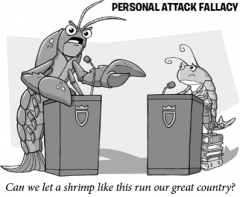
Latin for “against the person.”
Attacking the person rather thanthe argument. (Example: We can't let a woman like her to run president of our country!) |
|
|
AppealtoHypocrisy(Tu Quoque )
|
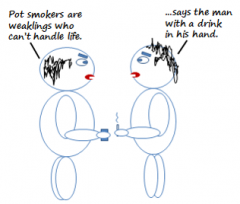
Latin for “you, too” or “you,also.”Suggests that because one doesn’t“practice what they preach,” their argument is discredited. This is fallacious. (Example
|
|
|
Appealto Fear
|

Occurs when one uses fear insteadof evidence or reason to get others to accept their proposition.
|
|
|
Appealto Bandwagon (orPopularity)
|
From Latin argumentum ad populum.The claim is considered to betrue because most people are favorably inclined toward a claim.“If many believe so, it is so.” (Like a "trend" almost)
|
|
|
No True Scotsman
|
Whenthe individual’s claim is challenged and then he or she changes theirdefinition or parameters. Instead of refuting the claim, “they dodge thechallenge by arbitrarily redefining the criteria for membership in that group.”
|
|
|
Equivocation
|

From Latin for “equal voice.”Giving utterance to two meaningsat the same time in one word or phrase.
|
|
|
Slippery Slope (or wedge argument)
|
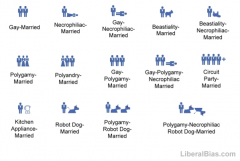
“Implies that the first stepnecessarily leads to the second, and so on down the slope to disaster, when infact there is no necessary slide from the first step to the second.”
|
|
|
Not Cause for Cause (also Post Hoc Ergo Propter Hoc or Faulty Cause and Effect)
|
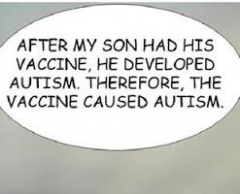
Latin for, “after this, thereforebecause of this.”A occurs before B. Therefore, Ais the cause of B. This becomes fallacious when there isn’t sufficient evidenceto support the claim. “One thing follows the other,therefore it was caused by the other”(Example: The rooster crowed. Thesun came up. Therefore, the rooster made the sun come up.)
|
|
|
False Dilemma (also False Dichotomy)
|

Dichotomy: a division into 2especially mutually exclusive or contradictory groups or entities.Oversimplified argument usingeither/or reasoning. (Either something is really good or really bad, nothing in between)
|
|
|
Composition and Division
|

Happens when one assumes “thatone part of something has to be applied to all or other parts of it or that thewhole must apply to its parts.”
|
|
|
Circular Reasoning (Also Begging the Question)
|
From Latin petitio principii,“begging the question.”“The conclusion of the argument is hidden among its assumptions—and so the conclusion, notsurprisingly, follows from the premises.” I.e. a circular argument where theconclusion is included in the premise.
|
|
|
Hasty Generalization
|

Inductive reasoning that reachesa conclusion based on faulty evidence.When one or few instances becomerepresentative of the whole.Often relies on stereotype,defined as: “a person or event treated as typical of the whole class," (Example: I can’t speak French. You can’tspeak French. Therefore, everyone at HCC Spring Branch can’t speak French.)
|
|
|
Appeal to Ignorance
|
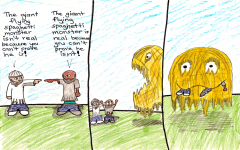
An argument for or against aproposition simplybecause there’s a lack ofevidence to the contrary.
|
|
|
Fallacy
|
Statements that may soundreasonable and/or true but are actually flawed and/or dishonest. Can be either illegitimatearguments or irrelevant points, and are often identified because they lack evidence to support their claims.
|

